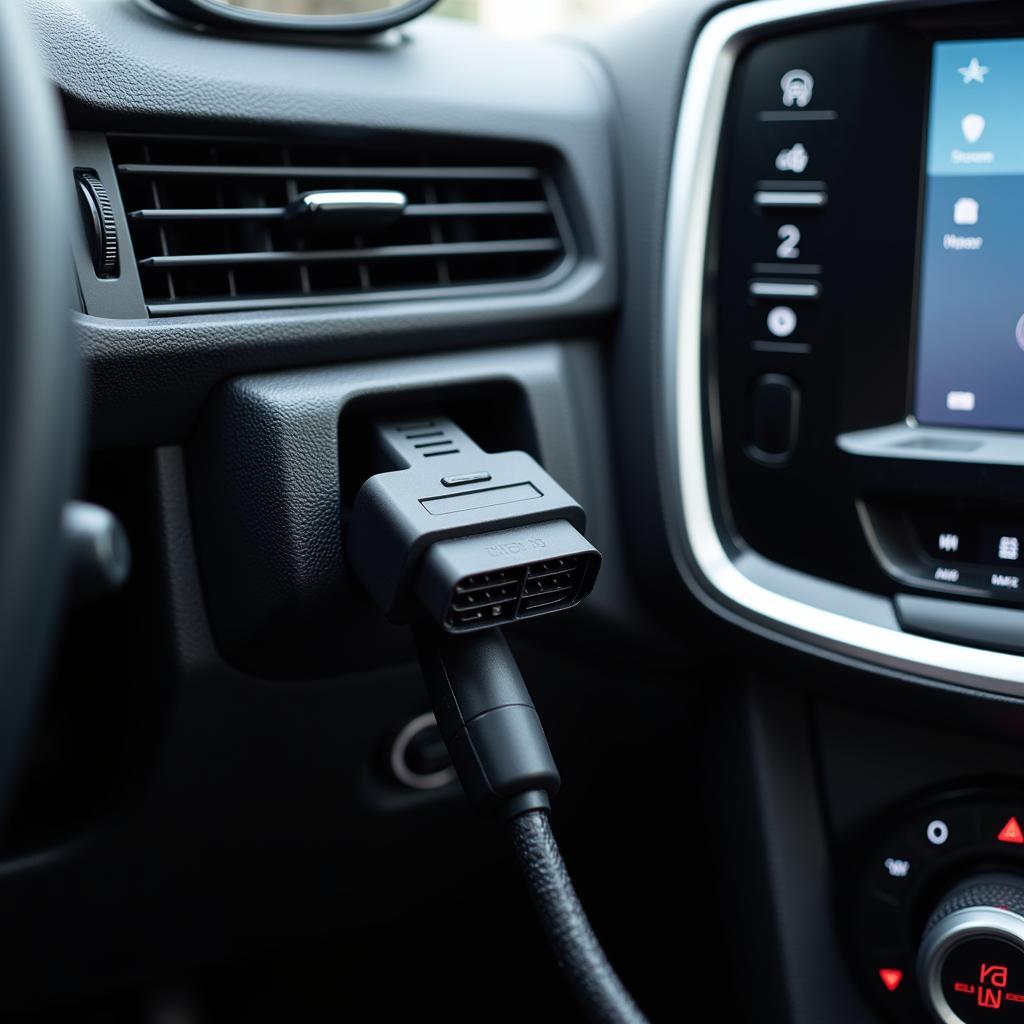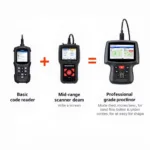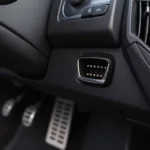OBD2 scan tools have revolutionized car diagnostics, giving car owners and mechanics the ability to pinpoint issues quickly and accurately. But with so many options available, choosing the right OBD2 scanner for your needs can feel overwhelming. This comprehensive guide will cover everything you need to know about OBD2 scan tools, from their functionality to factors to consider when buying one.
What is an OBD2 Scan Tool?
An OBD2 scan tool, also known as a code reader or diagnostic scanner, is an electronic device that connects to your vehicle’s OBD2 port. This port, typically located under the dashboard on the driver’s side, provides access to the vehicle’s onboard computer system.
By establishing this connection, the scan tool can retrieve diagnostic trouble codes (DTCs) stored in the vehicle’s computer. These codes indicate specific areas or systems where malfunctions are detected.
Types of OBD2 Scan Tools
OBD2 scan tools come in various types, each with different capabilities and price points:
-
Basic Code Readers: These affordable and easy-to-use devices can read and clear basic DTCs related to the engine and emissions systems. Ideal for car owners who want to understand and potentially fix simple issues themselves.
-
Advanced Scan Tools: Offering more comprehensive diagnostic capabilities, these tools can access multiple vehicle systems, including transmission, ABS, airbags, and more. They provide live data streams, graphing functions, and advanced troubleshooting features, making them suitable for professional mechanics.
-
Smartphone OBD2 Adapters: These compact and portable devices plug into the OBD2 port and connect wirelessly to your smartphone or tablet. By using dedicated apps, you can access a range of diagnostic information and features directly on your device.
How to Choose the Right OBD2 Scan Tool
Selecting the appropriate OBD2 scan tool depends on your individual needs and budget:
-
Frequency of Use: For occasional use and basic diagnostics, a basic code reader might suffice. However, professional mechanics or car enthusiasts who frequently work on vehicles would benefit from the advanced features of a high-end scan tool.
-
Vehicle Compatibility: Ensure the scan tool you choose is compatible with the make, model, and year of your vehicle. Some scanners specialize in specific car brands or models, offering enhanced diagnostic capabilities.
-
Features and Functionality: Consider the features that are most important to you, such as live data streaming, bi-directional control, special functions, and software updatability.
Benefits of Using OBD2 Scan Tools
Investing in an OBD2 scan tool offers numerous benefits:
-
Early Problem Detection: Identify potential issues before they escalate into major repairs, saving you time and money in the long run.
-
Accurate Diagnostics: Get precise diagnostic information, eliminating guesswork and unnecessary repairs.
-
DIY Repairs: Empower yourself to perform basic car maintenance and repairs, such as resetting warning lights and monitoring sensor data.
-
Improved Fuel Efficiency: By identifying and addressing engine-related issues, you can optimize fuel consumption and reduce emissions.
Conclusion
OBD2 scan tools are essential tools for anyone who owns or works on cars. They provide valuable insights into your vehicle’s health, allowing you to address issues proactively and make informed decisions about maintenance and repairs. By understanding the different types of OBD2 scanners available and considering your specific needs, you can choose the one that best suits your requirements and empowers you to take control of your car’s well-being.
Frequently Asked Questions (FAQs)
1. Can I use any OBD2 scan tool on any car?
While most cars manufactured after 1996 are equipped with the OBD2 port, compatibility can vary. Always check the scanner’s specifications and compatibility list to ensure it supports your vehicle’s make, model, and year.
2. Can an OBD2 scan tool fix car problems?
OBD2 scan tools primarily diagnose problems by retrieving and displaying DTCs. While they can sometimes guide you towards the root cause, they don’t inherently fix the issues. Repairing a car typically involves addressing the underlying mechanical or electrical problem identified by the scanner.
3. Are OBD2 scan tools difficult to use?
Basic code readers are generally user-friendly, with simple interfaces and clear instructions. Advanced scan tools might require some technical knowledge to interpret the data fully.
4. How often should I use an OBD2 scan tool?
It’s recommended to scan your vehicle at least annually or whenever you experience unusual car behavior, such as warning lights on the dashboard or performance issues.
5. Can I update the software on my OBD2 scan tool?
Many OBD2 scan tools, especially the more advanced models, offer software updates to keep up with the latest vehicle models and diagnostic protocols. Check the manufacturer’s website for available updates and instructions.
Need help choosing the right OBD2 scan tool? Contact our team of experts via WhatsApp: +1(641)206-8880 or Email: [email protected]. We are available 24/7 to assist you.


